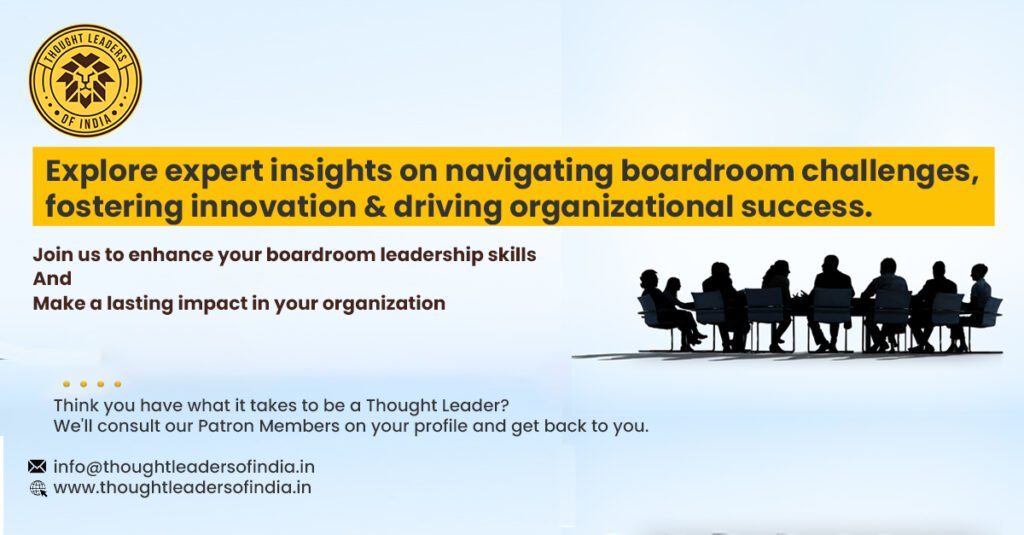Have you ever wondered what it takes to become a true leader in today’s fast-paced, ever-evolving business landscape? As an aspiring leader, the path to the boardroom can seem daunting, but with the right mindset, skills, and support, it’s a journey you can embark on with confidence.
In India, the demand for skilled leaders has never been higher. According to a recent study by the National HRD Network, over 60% of Indian organizations are facing a leadership talent gap, with a significant shortage of leaders equipped to navigate the challenges of the 21st century. This presents a unique opportunity for those willing to step up and take on the mantle of leadership. Stepping into the boardroom is often perceived as the pinnacle of one’s career journey—a place where decisions shape the future of organizations, industries, and sometimes even economies. For aspiring leaders, the allure of the boardroom lies not just in its authority but in the opportunity to drive impactful change and set strategic directions that resonate far beyond the confines of daily operations.
The Boardroom Landscape
Imagine a room where every decision carries weight, where strategic foresight meets operational reality, and where leaders must navigate complex dynamics with finesse and clarity. This is the boardroom—a place where the stakes are high, and the responsibilities immense. In India, the boardroom dynamics are evolving rapidly, reflecting global trends but also shaped by unique cultural, regulatory, and economic factors.
Understanding Boardroom Dynamics in India
In recent years, India has seen a significant evolution in corporate governance standards and boardroom practices. According to a report by KPMG, Indian boards are increasingly focusing on transparency, diversity, and ethical practices to enhance their effectiveness and accountability. For instance, the introduction of the Companies Act, 2013 mandated stricter guidelines on board composition, independent directors, and corporate disclosures, aiming to bolster investor confidence and governance standards.

Qualities of Effective Boardroom Leaders
To excel in the boardroom, aspiring leaders must embody certain qualities that transcend technical expertise.
- Developing a Visionary Mindset: Take the example of Satya Nadella, the CEO of Microsoft. When he took over the reins in 2014, Microsoft was struggling to keep up with the rapidly changing tech landscape. However, Nadella’s visionary leadership transformed the company into a cloud computing powerhouse, with Azure becoming a major revenue driver.
- Fostering a Culture of Innovation: Kiran Mazumdar-Shaw, the chairperson and managing director of Biocon, has been a trailblazer in fostering a culture of innovation in the Indian biotech industry. Under her leadership, Biocon has developed several groundbreaking biopharmaceutical products, including the world’s first recombinant human insulin. By investing in R&D and empowering her team to take risks, Mazumdar-Shaw has transformed Biocon into a global leader in the biotech space.
- Embracing a Growth Mindset: Byju Raveendran, the founder of BYJU’s, the world’s most valuable edtech company, is a prime example of a leader with a growth mindset. Raveendran started out as a teacher, but he quickly recognized the potential of technology in transforming education. By continuously learning and adapting to new technologies, he has built BYJU’s into a global phenomenon, with over 100 million users worldwide.
- Practicing Empathetic Leadership: Anu Acharya, the CEO of Mapmygenome, has been a champion of empathetic leadership in the Indian healthcare industry. Under her leadership, Mapmygenome has developed personalized genetic tests that help individuals understand their health risks and take preventive measures. By fostering a culture of empathy and collaboration, Acharya has built a team that is passionate about making a difference in people’s lives.
- Embracing Diversity and Inclusion: Nisha Dutt, the CEO of Intellecap, has been a trailblazer in promoting diversity and inclusion in the Indian social impact sector. Under her leadership, Intellecap has launched several initiatives to support women entrepreneurs and promote gender equality in the workplace. By embracing diversity and inclusion, Dutt has built a team that is passionate about driving positive change in the world.
Challenges and Opportunities
Navigating the boardroom terrain comes with its share of challenges. From managing conflicting interests among board members to addressing regulatory complexities, boardroom leaders must adeptly balance short-term goals with long-term sustainability. In India, boards are increasingly grappling with issues like digital disruption, ESG (Environmental, Social, and Governance) factors, and the imperative to embrace diversity at the leadership level.
Ethical Leadership and Governance
Ethics and integrity form the bedrock of effective boardroom leadership. The recent corporate scandals in India have underscored the importance of ethical conduct and governance frameworks. Leaders like Mr. Narayana Murthy, co-founder of Infosys, have championed ethical leadership by advocating for transparency, accountability, and ethical business practices. His principles have not only shaped Infosys’ corporate culture but have also influenced boardroom dynamics across industries.
Building Your Path to the Boardroom
For aspiring leaders aiming to step into the boardroom, continuous learning and professional development are essential. Engaging with platforms like The Leaders of India (TLOI) community provides invaluable networking opportunities, access to industry insights, and mentorship from seasoned board members. By joining TLOI, aspiring leaders can gain practical advice, attend workshops on boardroom dynamics, and connect with peers who share their aspirations.
Conclusion
Stepping into the boardroom is a transformative journey that demands resilience, vision, and a commitment to driving positive change. As India’s corporate landscape evolves, aspiring leaders must equip themselves with the right skills, knowledge, and ethical compass to thrive in this strategic arena. By embracing continuous learning and leveraging platforms like TLOI, aspiring leaders can chart a path to boardroom leadership that is both impactful and inspiring.

